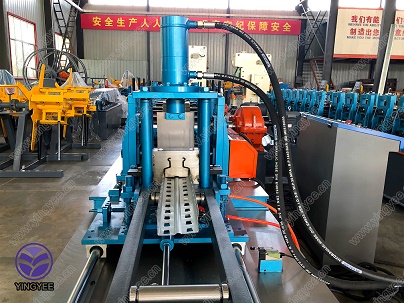
The Evolution of Supermarket Shelf Back Panel and Deck Panel Roll Forming Machines
In the contemporary supermarket landscape, the aesthetic and functional design of product shelving plays a crucial role in enhancing customer experience and maximizing sales. Among the essential components of these displays are the back panels and deck panels, which provide not only structural support but also visual appeal. The efficiency of producing these components is significantly enhanced by the use of roll forming machines designed specifically for this purpose.
Understanding Roll Forming Technology
Roll forming is a versatile manufacturing process where long strips of metal are shaped into specific profiles as they pass through a series of rollers. This method is widely utilized in producing a variety of products, including the back and deck panels found in supermarket shelving systems. The process offers several advantages including consistent quality, high production speeds, and reduced material waste.
Modern roll forming machines can be customized to meet the specific design and dimensional requirements of supermarket shelving components. This adaptability is particularly important as market trends shift and consumer preferences evolve. For instance, as stores move towards modular and flexible shelving solutions that can accommodate diverse product sizes and shapes, the roll forming technology must be capable of producing panels that can easily integrate into these systems.
Features of Supermarket Shelf Back Panel Machines
A specialized roll forming machine for supermarket shelf back panels is engineered with several key features. Firstly, the machine is equipped with multiple forming stations that enable complex profiles to be created in a single pass. This translates to reduced production time and higher efficiency. Additionally, these machines often include decoiling, leveling, and cutting mechanisms to provide a complete inline solution, minimizing handling and transfer times between stages.
Automation is an essential aspect of modern roll forming machines
. With the integration of advanced control systems and robotics, the production process can be monitored and adjusted in real-time to ensure optimal performance. This automation not only enhances output but also improves safety by reducing the likelihood of human error.
Deck Panel Roll Forming Machines Enhancing Functionality
Deck panels, which serve as the flat surfaces on shelves, require durability and strength to support various types of merchandise. Roll forming machines designated for deck panels are designed to produce robust and lightweight components. The use of high-strength materials coupled with precise engineering results in products that can withstand daily wear and tear, ensuring longevity.
Moreover, deck panel roll forming machines can also incorporate additional features such as perforation or embossing, which not only add to the aesthetic value of the panels but can also enhance their functionality. For example, perforated panels facilitate better airflow around perishable items, supporting their freshness and reducing spoilage.
Sustainability in Production
In recent years, there has been a growing emphasis on sustainability within the retail sector. Roll forming machines contribute to this movement by reducing material wastage during the manufacturing process. The ability to recycle scrap metal directly into the system minimizes the environmental footprint, aligning with the goals of many supermarkets to source eco-friendly materials.
Furthermore, the durability of products produced by roll forming supports the sustainability agenda by minimizing the need for frequent replacements. Supermarkets are increasingly investing in high-quality shelving systems that last longer and perform better, ultimately leading to reduced costs and environmental impacts over time.
Conclusion
The development of supermarket shelf back panel and deck panel roll forming machines has transformed the way retail environments are designed and constructed. With their ability to produce high-quality, durable, and aesthetically appealing components efficiently, these machines are essential tools in the modern supermarket industry. As consumer expectations continue to evolve, the role of advanced manufacturing technologies like roll forming will remain pivotal in meeting these demands while promoting sustainability and efficiency in production. The future of supermarket shelving looks promising with these innovations leading the way, ensuring both functionality and style in the retail space.